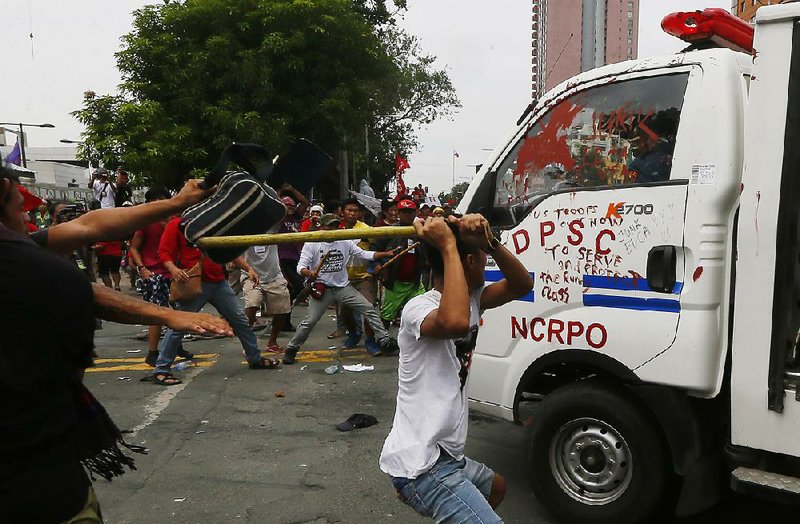MANILA, Philippines -- A Philippine police van rammed into protesters, leaving several bloodied, as an anti-U.S. rally turned violent Wednesday at the U.S. Embassy in Manila.
The van's driver, police officer Franklin Kho, told reporters he did not deliberately hit the protesters but that he was trying to drive away from them because they were hitting the vehicle with wooden clubs and he feared they would commandeer it and use it to attack other policemen. "They were already trying to seize the vehicle," Kho said.
TV footage showed the van repeatedly ramming the protesters after activists surrounded and started hitting it with the wooden batons they had seized from police.
The van suddenly charged backward then advanced twice over a space of about 60 feet, barreling through the scattered protesters and throwing some to the side. A few were run over but managed to stand.
Some screamed in surprise while others hurled stones at the van and yelled invectives. A protester over a loudspeaker called the police "puppies of imperialists."
At least three student activists were taken to a hospital after they were run over by the van, protest leader Renato Reyes said.
"There was absolutely no justification for it," Reyes said of the violent police dispersal of about 1,000 protesters. "Even as the president vowed an independent foreign policy, Philippine police forces still act as running dogs of the U.S."
More than two dozen policemen were injured, police officials said, adding that officers observed "maximum tolerance" but that rowdy protesters kept assaulting the law enforcers.
Police lobbed tear gas and arrested at least 29 protesters who broke through a line of riot police and hurled red paint at the officers and a U.S. government seal at the start of the rally at the seaside embassy compound.
A firetruck doused the rowdy protesters with water to push them back, but they took hold of the water hose and confronted the outnumbered police with rocks and paint. After breaking through the police corridor, they painted "U.S. troops out now" and other slogans at the embassy's tall fence.
The national police said in a statement that the violent dispersal was "unfortunate" and that an investigation would try to determine whether the riot policemen followed crowd-control procedures. Investigators also will evaluate criminal and civil liabilities of the protesters and their leader over an allegedly illegal mass assembly.
A leftist legal group, the National Union of People's Lawyers, condemned the police violence and said it would help the injured and detained protesters file criminal complaints against the police for violating their constitutional rights to free assembly.
The protesters, consisting of students, workers and tribesmen, were demanding an end to the presence of visiting U.S. troops in the Philippines and to support a call by President Rodrigo Duterte for a foreign policy not dependent on the U.S., the country's longtime treaty ally.
The activists were from a leftist umbrella group, Bayan (Nation), which has organized regular anti-U.S. protests in front of the embassy for decades, most of which are peaceful.
Duterte was on a state visit to China, where he is seeking to repair relations strained under his predecessor over territorial conflicts in the South China Sea. He also is seeking to expand trade as well as investments and financing for badly needed infrastructure projects.
In an uneasy relationship with the U.S., Duterte has tried to reach out to China and Russia, raising uncertainty about his country's long alliance with the U.S.
But the protesters also opposed the president's effort to lean toward China. "The Philippines will not be dictated on, whether by the U.S. or China," they said in a statement.
The violence happened as the police and Duterte are under increased international scrutiny over the killings of thousands of drug suspects and pushers as part of the president's war on illegal drugs.
Information for this article was contributed by Jim Gomez of The Associated Press.
A Section on 10/20/2016
